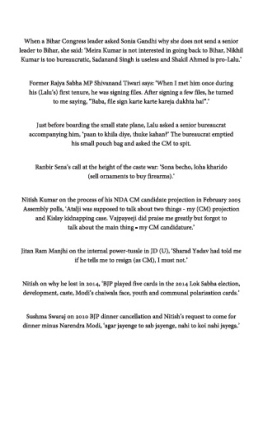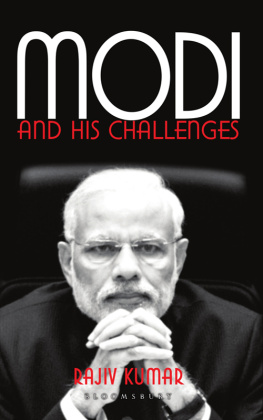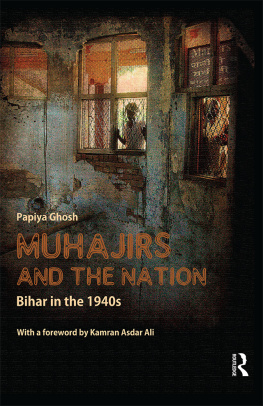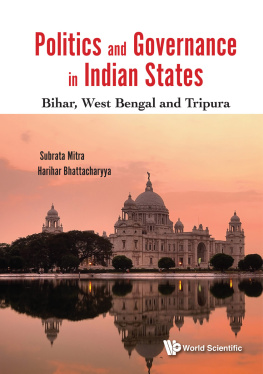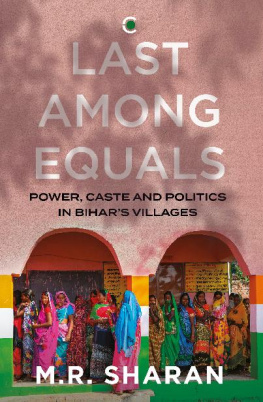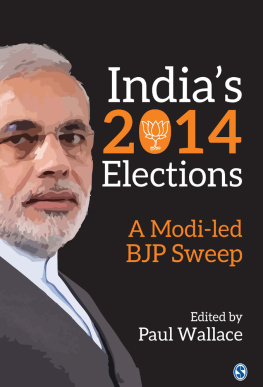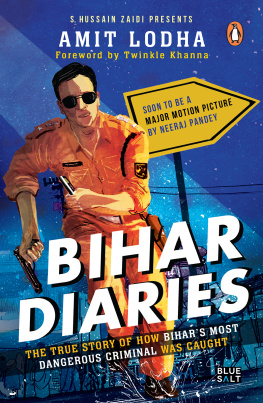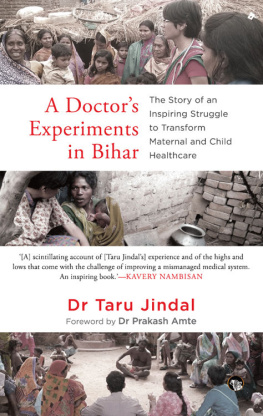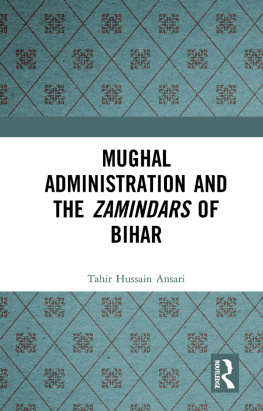RULED OR MISRULED
THE STORY AND DESTINY OF BIHAR
SANTOSH SINGH
B L O O M S B U R Y
NEW DELHI LONDON OXFORD NEW YORK SYDNEY
First published in India 2015
2015 by Santosh Singh
All rights reserved. No part of this publication may be reproduced or
transmitted in any form or by any means, electronic or mechanical, including
photocopying, recording, or any information storage or retrieval system, without prior
permission in writing from the publishers.
No responsibility for loss caused to any individual or organization acting on or
refraining from action as a result of the material in this publication can be
accepted by Bloomsbury or the author.
The content of this book is the sole expression and opinion of its author, and
not of the publisher. The publisher in no manner is liable for any opinion or views
expressed by the author. While best efforts have been made in preparing this
book, the publisher makes no representations or warranties of any kind and
assumes no liabilities of any kind with respect to the accuracy or completeness
of the content and specifically disclaims any implied warranties of
merchantability or fitness of use for a particular purpose.
The publisher believes that the content of this book does not violate any
existing copyright/intellectual property of others in any manner whatsoever.
However, in case any source has not been duly attributed, the publisher may
be notified in writing for necessary action.
BLOOMSBURY and the Diana logo are trademarks of Bloomsbury Publishing Plc
ISBN 978 93 854 364 20
Bloomsbury Publishing India Pvt. Ltd
DDA Complex, LSC Building No.4
Second Floor, Pocket C 6 & 7, Vasant Kunj
New Delhi 110070
www.bloomsbury.com
To find out more about our authors and books visit www.bloomsbury.com.
Here you will find extracts, author interviews, details of forthcoming
events and the option to sign up for our newsletters.
To,
My parents Sanjay Prasad Singh and Premlata Singh,
who are responsible for me and my wife Pinky,
who ensures I remain so
I am forever walking upon these shores,
Betwixt the sand and the foam.
The high tide will erase my foot-prints,
And the wind will blow away the foam.
But the sea and shore will remain for ever.
(Sand and Foam, Kahlil Gibran)
Contents
Acknowledgements
I am grateful to my organisation, The Indian Express, for permitting me to write the book, my Chief Editor Raj Kamal Jha for his suggestions for making it a reporters book, my Editor Unni Rajen Shanker, otherwise a hard taskmaster, for allowing the rare freedom to digress from my prime job.
To Bloomsbury India Managing Director Rajiv Beri and Publisher Praveen Tiwari for their passionate involvement in getting a book out of me in record time and editor Manisha Jain for her excellent editing.
My seniors in journalism Nalin Verma and Surendra Kishore for guiding me with their insight, suggestions and contacts, friends Amitabh Srivastava, Manoj Chaurasia, Braj Mohan Singh, Rajeev Ranjan Roy and Arun Kumar for engaging discussions and Raj at Mukherjee for sending those political SMS alerts and bullet points from Delhi, fellow ACJians Abhrajeet Gangopadhyay (AB), Amandeep Sandhu, Debabrata Mohanty and Anuja and my predecessor at Express JP Yadav for their encouragement.
My father Sanjay Prasad Singh and uncle Mrityunjay Prasad Singh for being my first teachers at a village where English language still remains an alien, my brothers and three gems Ashutosh, Paramtosh and Mantosh, for their witty interventions and Babul Bhaiya, Ashutosh and Animesh for their faith in me. My sister-in-law, Neeta for her beautiful illustration for my subject and photojournalist friend, Prashant Ravi for completing my story.
Last but not the least, my wife Chitra (Pinky) for always pushing and prodding me to be equal to the big task, of course, with intermittent doles of green tea, my son Shaswat for almost throwing a challenge by asking me if there could ever be an interesting book on politics and my little doll, Shivangi for understanding the absence of my presence at home during the process.
Introduction
The politics of Bihar has always been intriguing; a subject of great interest inside and outside the state, and even abroad. Bihars politicians themselves never tire of harping on all the great things about Bihar the Buddha, Mahavir, Ashok, our culture and dialects, the Ganga, the ancient university of Nalanda, even our unparalleled litti-chokha and yet, all that everyone else seems to want to discuss are Bihars politics and politicians.
There is no doubt that Biharis are extremely political people and that every Bihari, in a sense, is an expert in politics. Its a game that they seem to enjoy, and one that Bihars politicians have played tirelessly, sometimes at the expense of the state itself.
The emergence of Lalu Prasad, one of the two superstars of this game, heralded a new era in the politics of Bihar. His antics and mannerisms thrilled and seduced both voters and watchers, in Bihar and outside, and his popularity travelled beyond the borders of India. It was deeply thought-out politics packaged in a style that had never been seen before. And yet, this kind of politics had its limits and life span. With the emergence of Nitish Kumar, Lalus clownish frivolousness gave way to a grave seriousness, and unabashed casteism to slogans of development and some deft social engineering.
Today, Bihars politics lies at the cusp of caste and development having traversed through the upper-caste centric Congress politics to the social justice phase of Mandal messiah Lalu to Nitish Kumars mantra of social justice with development. While the Congress collapsed under the weight of its complacency and ultra-Brahmin politics, and was dealt lethal blows by the JP movement, the socialist upsurge and the Bhagalpur riots, Lalu could not become anything more than the great symbol of the voice of the voiceless. He did bring pride to the deprived sections, but pride could not have filled empty stomachs.
The results of the 2014 Lok Sabha elections showed the lines between development and caste were blurred and while caste was the biggest reality of Bihars politics, the promise of development had begun to play an important role in the narrative. And as the state heads into what could be its most important election ever, the Nitish Kumar vs Narendra Modi battle is also a battle between two models of development.
The other name in the mix is of Ram Vilas Paswan the politician who could have become a national Dalit icon, but frittered away the opportunity because of his obsession with short-term politics and love for the comfort zone.
And then there is Jitan Ram Manjhi, the Mahadalit who was made aware of the importance of his surname by Nitish Kumar. That Manjhi could quickly find the confidence to revolt against Nitish suggests that a phase of transfer of power to the Scheduled Castes remains due in Bihar at some point.
The clash of personalities between Nitish and Modi has been fascinating to watch. Face-offs between individual leaders are not uncommon, but such intense engagement between a Prime Minister and Chief Minister, with each trying constantly to prove a point to the other, has been rare in Indian politics. It is a story of talented OBC compatriots of similar strengths, one of whom has come to occupy the narrow space at the top, while the other hopes to mount an ambitious challenge to him.
My book is primarily based on interviews with the central characters, witnesses and observers in this great political drama. I have drawn heavily from my coverage of Bihar for The Indian Express, and have tried to tell an unalloyed story, from both the village and town, weaving my observations into the narrative. I often think of Anatole Frances story, Our Ladys Juggler, which describes the juggler who can only juggle, and who continues to juggle even during prayer. I have always backed my strength as a field man, whose job is to view all situations from a 360-degree viewpoint. My book is an extension of my reporting, with far greater stress on providing information and analysis rather than theory and punditry.

